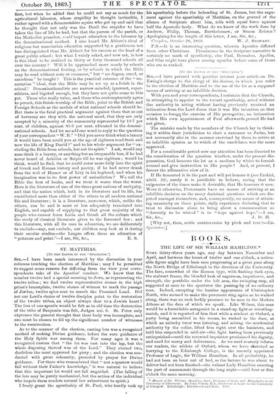[TO THE EDITOR OF THE "SPECTATOR."]
SIR,—I have perused with peculiar interest your article on Dr. Ewing's charge to the clergy of his diocese, in which you refer to the election of Matthias and to the use of the lot HS a supposed means of arriving at an infallible decision.
With you and your correspondents, I maintain that the Church, in attempting to appoint to the vacant apostleship, acted without due authority in acting without having previously received an intimation from the Lord Jesus that it was His intention on that occasion to foregcl the exercise of His prerogative, an intimation which His own appointment of Paul afterwards proved He had not given.
The mistake made by the members of the 'Church lay in think- ing it within their jurisdiction to elect a successor to Judas, but not necessarily also in the manner exercised by them to arrive at an infallible opinion as to which of the candidates was the more approved.
For a considerable period now my attention has been directed to the consideration of the question whether, under the present dis- pensation, God honours the lot as a medium by which to furnish counsel and give instruction to His people ? And, at present, I favour the affirmative view of it.
If He honoured it in the past and will yet honour it (see Ezekiel, xlviii. 29), surely it is justifiable to believe, seeing that the exigencies of the times make it desirable, that He honours it now. Were it otherwise, Protestants have no means of arriving at an infallible decision on the many doctrinal questions which are dis- puted amongst themselves, and, consequently, no means of attain- ing unanimity on those points, daily experience declaring that to trust to discussion alone to bring about a consummation so "devoutly to be wished" is to "hope against hope."—I am, Sir, &c., J. D. H. [Why not, then, settle controversies by pitch and toss ?—En. Spectator.]






























 Previous page
Previous page